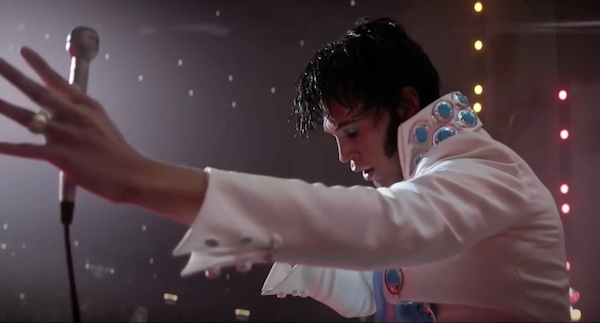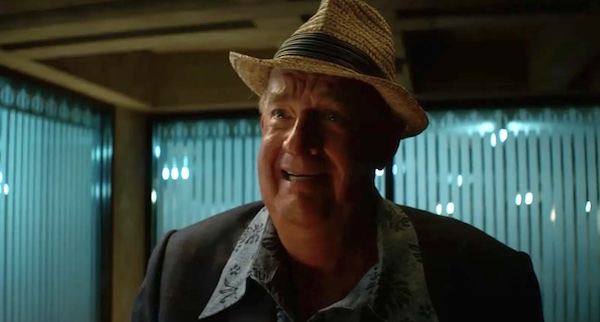Film Review: The Devil and “Elvis”
By Tim Jackson
For 2 hours and 39 minutes, I was happy to sell my soul to Lucifer.
Elvis, directed by Baz Luhrmann. Playing at the Somerville Theater, Kendall Square Cinema, AMC Assembly Row 12, and Apple Cinemas Cambridge.

Austin Butler as Elvis in Elvis.
I am not a fan of Baz Luhrmann’s hyperkinetic Moulin Rouge and was lukewarm about The Great Gatsby. But in his latest film, Elvis, the director has arranged an effective marriage of his hyperactive filmmaking style with a larger-than-life subject. In terms of its trajectory, Elvis Presley’s career fits neatly between the materialist bombast of Moulin Rouge and the tragedy of Gatsby. (Here is another self-made millionaire whose need for love engendered his demise.) Elvis’s mythological afterlife typifies the best and worst of the American dream turned nightmare. A poor white boy from Tupelo, Mississippi, graced with beauty, innate talent, and endless ambition, became a super-rich superhero who self-destructed as he morphed into a grotesque parody of himself. In Luhrmann’s version of the tale, much of the blame for the singer’s decline rests on his corrupt and corrupting manager.
Colonel Tom Parker was a beefy, blustery, fast-talking ex-carny hustler with a sharp sense of show and a keen mind for the entertainment business. He called himself the “snowman” for his “snowing” skills, described in Alana Nash’s book The Colonel as “the exquisitely performed act of separating people from their money, leaving them with a smile on their face and melting away before they realized what had taken place.”
Tom Hanks, transformed through prosthetics, plays the Colonel and narrates the story. He begins by denying all accusations that he exploited Presley. His face is the first one we see before the screen explodes into a montage of images that recount Elvis’s zenith with split screens, reenactments, rapid-fire juxtapositions, superimpositions, and animations of the comic books that fed young Elvis’s dreams of heroism. At first, the star is teasingly glimpsed from behind or in iconic poses, hair hanging over his forehead. When Austin Butler finally is seen in full, it is mesmerizing. After having pored over archival footage and worked extensively with movement and vocal coaches, Butler’s transformation into the King of Rock and Roll is a triumph.
Colonel Parker lurks around, observing the early hysteria. He approaches Presley at a carnival in a scene that could be straight out of Del Toro’s Nightmare Alley. The two mount a Ferris wheel. As the wheel reaches its (metaphorical) apex, looking like a cross between Shylock, Danny DeVito’s Penguin, and the Devil himself, Parker makes his pitch to manage Elvis, promising a route to success that’s beyond the singer’s wildest imaginings. To drive the point home, the Ferris wheel morphs into a record turntable. His circular rise to fame and fall into drugged-out oblivion has begun.

Tom Hanks as Colonel Parker in Elvis.
Luhrmann wastes no time zipping through the highlights of Presley’s early career. A young Elvis and his two “Negro” playmates peek into a brothel. There they spy an old blues singer performing, as a couple draw into an erotic embrace. Hearing more music from across the way, he races over to a church and finds himself in the embrace of a revival meeting. This single sequence weaves together Elvis’s primal influences — sex, roots music, and religion. The rest of the story is propelled by glitzy montages, swirling, ascending, and descending cameras, stunning compositions and cinematography. Luhrmann’s glittery style is well suited for fashioning what is more of an American folk tale than a biopic.
For a good third of the film there is rarely a shot that lasts more than 10 seconds. The camera finally settles down when Elvis sits with his mother, Gladys, to receive her blessing for signing with Parker. It has been reported that Presley adored his mother to an almost unnatural degree. She, in turn, was protective and loyally supported his performances, even when the press condemned the singer’s sexualized stage moves. Her death, following Elvis’s stint in the army, devastated him. Parker had easily convinced the Presleys to sign a contract; he made Elvis’s father, Vernon, the “business manager” of Presley enterprises. Vernon, who outlived his son, is shown here to be sadly ineffective, cowed by the Colonel’s silver tongue.
That raises the question of the film’s contract with its viewers. Is there a similarity between Elvis’s deal with the demonic Colonel Parker and our accepting Luhrmann’s purported version of events in Elvis’s life? Elvis was a complex and extraordinary performer whose rise and fall came amidst a changing cultural landscape. The man could be admirable and he could be tacky. In the film, his career is depicted with the superficial gloss of a Wes Anderson film, polished up with a healthy dose of the maximalist flash of Gaspar Noé. Critical parts of Presley’s biography are missing; significant facts are ignored completely. Where is Elvis’s landmark performance on the Ed Sullivan Show? His visit to the White House to hang out with Nixon? Other elements glossed over or just hinted at: Elvis’s obsession with guns, his disappointment over how his film career was handled, his many affairs and addictions. Isn’t the framing device — Parker’s deathbed narration — just another act of directorial hucksterism?
The credo of Elvis’s “Memphis Mafia” was TCB — Taking Care of Business. Luhrmann has adopted that slogan as his own for Elvis. Following in Parker’s footsteps, that business is entertainment. Anchored by Butler’s powerful incarnation of the King, facts are transformed into fleeting and fanciful images that befit the mystique of an icon who, 45 years after his passing, feels more like a mythic creature than flesh and blood.
For an in-depth understanding of Elvis, I suggest reading Peter Guralnick’s thoroughly researched biographies, Last Train to Memphis and Careless Love. The books are not hagiographic, and they will clarify moments in the film in which stubborn facts can be buried amidst dazzling montages
Meanwhile, for 2 hours and 39 minutes, I was happy to sell my soul to Lucifer.
Tim Jackson was an assistant professor of Digital Film and Video for 20 years. His music career in Boston began in the 1970s and includes some 20 groups, recordings, national and international tours, and contributions to film soundtracks. He studied theater and English as an undergraduate, and has also worked helter skelter as an actor and member of SAG and AFTRA since the 1980s. He has directed three feature documentaries: Chaos and Order: Making American Theater about the American Repertory Theater; Radical Jesters, which profiles the practices of 11 interventionist artists and agit-prop performance groups; When Things Go Wrong: The Robin Lane Story, and the short film The American Gurner. He is a member of the Boston Society of Film Critics. You can read more of his work on his blog.
Tagged: Austin Butler, Baz Luhrmann, Elvis, Elvis Presley, Tim Jackson

Enjoyable read, convinced me to see it!
Great review! I’ll try to see it on the big screen in Somerville where are the stage is lavish gold and velvet!
I’m looking forward to seeing it. And a good reminder to read Last Train to Memphis.
Any doubts about seeing the film dispelled by your cool review.
Nicely written, makes me want to see it, thanks Tim!
Well-written, thoughtful review! Now I wanna see the movie. Tim Jackson gets bonus points for making me look up “hagiographic.”
Exceedingly stylish, smart review. Convinced me not to see the movie… until I can do so for “free,” that is. As an ardent lover of Presley’s early work, a vociferous hater of his Hollywood movie refuse (even the best of it barely watchable) , a one-time Elvis imitator, I am hard to please on this subject. I do believe Elvis is the perfect symbol of American dissolution. But I thought the relatively recent TV doc was initially compelling yet ultimately an overcooked sociological pose…a new breed of hagiography. So, I dig every word of your review. By the way, my distaste for Luhrmann’s hyper “Gatsby” was nicely recalled by your great phrase “directorial hucksterism”! I’m glad Baz has found a subject better suited to his circus-act style than F.Scott Fitzgerald.